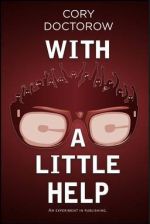The Future Imperfect
I am waiting out a spring storm, pulled over to the side of the highway in my old Volvo, sending an email to one friend while calling another to tell him I’ll be late. The audiobook version of Anne McCaffrey’s The Ship Who Searched is playing on my Kindle, which I’ve hooked into the car stereo. As I sit here, surrounded by technologies that did not exist when I was born—cell phones, e-readers, email—it’s impossible not to notice that I’m living in a world that contains more technological wonders than McCaffrey had imagined. The protagonists in the story would have been much helped, for instance, by a secure communications channel and a GPS system, both of which I have in my battered old car. But most of all, the heroine of this book would have been helped by a future shaped by the actions of today’s disability activists. Because, at its heart, this series of books tells the story of the enslavement of extremely promising children who have the bad luck to be born—or in this one case alone, become—disabled.
The basic plot device behind these stories is horrific enough that I can’t paraphrase McCaffrey’s own words without coloring them, so I will let her speak for herself. The first book in the series, The Ship Who Sang, begins:
She was born a thing and as such would have been condemned if she failed to pass the encephalograph test required of all newborn babies. There was always the possibility that though the limbs were twisted, the mind was not; that although the ears would hear only dimly, the eyes see vaguely, the mind behind them was receptive and alert.
The electro-encephalogram was entirely favorable, unexpectedly so, and the news was brought to the waiting, grieving parents. There was a final, harsh decision; to give their child euthanasia or to permit it to become an encapsulated ‘brain…’ (The Ship Who Sang)
In this series, those children who are deemed worthy are turned into productized, commodified “shell people;” brains who manage the complex tasks associated with running hospitals, space stations, and even piloting starships. They can, if they are lucky, eventually earn enough to buy their own freedom but, until they do, their “bodies” are owned by the company which funded their development and implantation.
In other words, in McCaffrey’s world, disability is so depersonalizing that the very promising are rewarded with slavery and disembodiment; those who don’t pass the test for these rewards are put to death.
The friend I am going to visit is named Larry. If I ever get out of this storm, I should arrive shortly after his nighttime aide has wheeled him into his bedroom and, using an elaborate webbed harness that attaches to an electric lift, helped him get from chair to bed. She’ll lay out the things he needs for the night: two telephone handsets, in case one goes dead, a bottle of water, the book he’s reading, the TV remote, and an emergency call button that will summon an ambulance. I have just enough time to hear the entire book read, and if I listen to it the whole way I will have worked myself up into a heady righteous indignation by the time I go to sit by his bedside and have an evening drink. He’ll try to calm me down; Larry doesn’t have my stomach for political debate. He’ll tell me that it’s only a story. I will tell him the stories we tell about our futures become our futures, point out that my phone looks a lot like an old Star Trek communicator, point out that the special mattress he sleeps on was developed by the space program. Over very old Scotch, we’ll agree to disagree.
A truck screamed by, the brakes on fire, just a few seconds ago and now it sits jackknifed across the highway several yards away. Hailstones hit the car so hard that, in a few places, they scratch the paint. What would it be like if that hard, metal shell were my body? And what if I did not own that body, could not decide where it went or what it did?
Navigate: Page 1 Page 2
























35 comments
So many of the characters in Heinlein’s works had disabilities that future science made almost as irrelevant as freckles. I have some faith that our future science will operate in the manner Heinlein envisioned. Where my faith fails me is in my ability to forsee a world as accepting as those he constructed. Science has not built an artificial device that corrects intolerance, indifference or bigotry. Maybe we need pacemakers for the soul.
[…] The Future Imperfect by Sarah […]
[…] 8, 2010 Sarah Einstein writes Disability is created by the ways in which we live. I couldn’t carry two five gallon buckets of […]
It’s sadly rare to find someone who shares my opinion of the Ship books. Too often the disability aspects and slavery are overlooked for the ‘this is cool’ factor. And ‘this is cool’ is something to beware of in responding to Sarah’s idea. As disabled people we don’t just need cool technology to be equal, we need a true change in the way that people regard disability.
As a disability activist I talk about ‘models’ a lot, where a model is the way that someone responds to impairment. Doctors tend to see us as broken, something to be fixed, often without regard to what we really want, that’s the Medical Model. The public mostly see us through the Personal Tragedy Model, which pities and demeans us as the able man’s burden. For many of us the model we chose is the Social Model, which defines disability as the discrimination we experience as the result of our impairment, whether that discrimination be the absence of an access ramp, or someone patting us on the head while prattling about how brave we are.
But even in a utopia fully enabled by the principles of the Social Model, disability will still have an impact. Being disabled takes time and saps energy, for many of us fatigue and pain are the major disabling impacts of our impairment. An accessible world may still be one beyond our ability to access.
This is fascinating. If the world is totally accessible, does disability even exist? Personally, i don’t feel disabled until my lift breaks down, etc.
Are multiple submissions allowed?
The concept is flawed because in an “accessible world” access would even be a consideration. Access exists as an issue because people who have impairments are “other” – their non-comformity being the lack of ‘normality’ and their exploitative value. The discrimination isn’t the result of our impairments, it is the result of how a given society relates to those with impairments. Under these conditions, what events – political, social and economic – would need to take place to transform a disablist world into an inclusive one? Remember ‘disability’ within the social model refers to oppressive social relations within the structures, systems and cultures of specific societies.
Bob,
I’m not sure where we are disconnecting, because I whole-heartedly agree with you. The challenge is not to write a story in which ableism has magically become kittens and rainbows. It is to imagine that this single dimension of compulsory able-bodiness has been addressed. We talk about wanting U.D.–so, okay, what if we got it? Science Fiction let’s us dream of new ways of living and then examine those dreams for their many possible outcomes.
I’m surprised no one’s mentioned Lois McMaster Bujold as an example.
Let me see if I understand: You’re looking for a story in which the Who, What, Where and How seem perfectly ordinary to the characters, disabled and non, but in the back of the reader’s brain something will say “This couldn’t happen Here and Now, because of the meanings disability has in our world.”
Is that it?
I am afraid I make things more confusing when I try to claify them! The call, which was written by the editors, explains it far better than I can. I feel strongly that any more direction would rob us of the chance to see brilliant and surprising work.
I don’t think it is about us “disconnecting”, Sarah. The issue is mindset – not as individuals but as societies. Accessibility surely is about what needs to be – the steps required to be inclusive, accepting and dynamic. If the social environment became inclusive and accepting, then I would argue “access” would cease to be an issue because disability as opposed to impairment would not be socially tolerated – a reverse of the current socio-political discourse.
There are cultural issues around impairment/disability e.g. in the UK, impairment is the body’s state of being and disability is the experience of negative social interactions.
I’m with Melissa Mead; Lois McMaster Bujold has to come into this conversation _somehow_, at least with regard to her characters Miles Naismith Vorkosigan and Mark Pierre Vorkosigan. Granted, they take their disabilities/limitations in stride but their society doesn’t — the interplay/juxtaposition of these things helps drives the stories “Komarr,” “Mirror Dance,” “A Civil Campaign,” “The Vor Game,” and most especially “The Warrior’s Apprentice.” But they do not let their limitations stop them in any way, shape or form.
If you’re looking for more than that — and it sounds like you are — I’m not sure in what way that could be handled.
And “Falling Free.”
(Can you tell I’m a LMMB fan? ;))
Same here. And Eric Flint. And KD Wentworth. “The Course of Empire” was excellent, and “The Crucible of Empire” was nearly as good.
I’ve read 1632, but not those. I’ll have to check them out. Thanks for the mention!
I’ll note that in the ‘brains’ in the ‘Ship who sang’ aren’t merely disabled but require at least some life support equipment to survive and today when a baby is born which will need to be connected to life support equipment for the rest of it’s life to survive it is often not connected. This is not (legally speaking) euthanasia but the end result is the same, so the situation in Mccafrey’s books is already better than it is in real life.
Unicorn,
I’d be interested on your take on these issues as they are problematized in The Ship Who Searched. The young woman in question is older, is being saved only from paralysis and not death, and there is a “twist” at the end which, I think, changes everything. In order to avoid a spoiler, I’ll just ask if you have read this to the end and discovered the “new option” for brainships, and if so, how do you feel about the fact that this option would only be available to those shell people who made a lot of money and earned it?
This is what I love about scifi… it lets us consider ethical and social questions in the abstract and without the constraints of what we really “can” or “can’t” do.
I believe I’ve read all the books in the ‘Brainship’ series. As to how I feel about the new option only being available to those with a lot of money – about the same way I feel about how in real life there are a bunch of very expensive, not covered by insurance treatments that can save lives, or help thousands live something closer to normal. In ‘The ship who searched’ the option was just invented, the heroine was in fact the test case which proved it could actually work, and at that point cost more than most people make in their life and while it’s unfortunate if the choice is solve one person’s quality of life issue, or save 100 lives then in my opinion the correct answer is to tell that person ‘sorry, you’ll have to find the money for this on your own’. (Note that’s quality of life vs. life. If it’s life vs. life the question becomes a lot more stickier because to quote Heinlein “Lives are not integers, they’re infinities”)
If you want a problematic issue in the ‘ship who searched’ is that the shellperson project is the only place where they can fit a person with direct neural hookups because while being confined to a wheelchair with life support systems would be incredibly unpleasant to say the least, being able to control the wheel chair and the robotic arms it had in the book with a thought would go far to make it more bearable – and that, unlike the option revealsed at the end is something that could have and should have been offered to the heroine, and anyone else in a similar situation, even if they did not have the special whatever that allowed the Heroine to become a shell person as old as she was.
One more thing – trying to fit the rules mentioned in any two of the Brainship books into a single framework is IMO impossible.
[…] This essay by Sarah Einstein discusses the use of disability in science fiction. She writes that disability in science fiction is almost always used as a metaphor, symbolic of something about the character or their circumstances. As she writes, “This is not the sort of future disability advocates envision […] We envision a future in which disability—like race, gender, ethnicity, and other identity axes—may inform, but certainly not define, who a person is.” […]